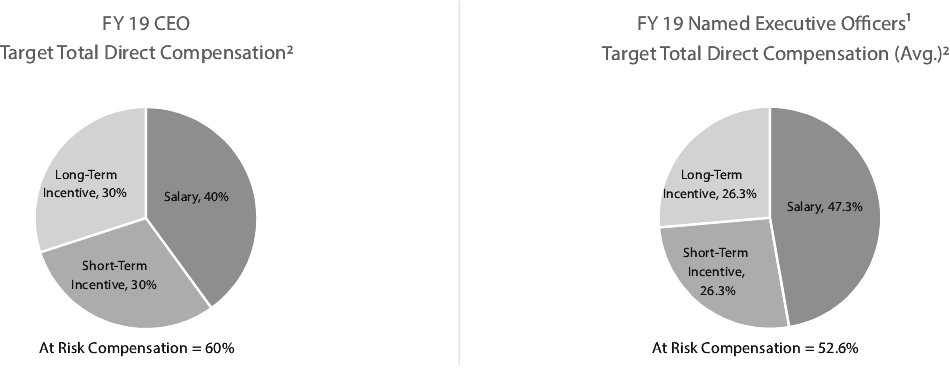performance against their respective individual performance goals and objectives and setting compensation levels based on that evaluation.
With respect to corporate performance, at the beginning of each year the Compensation Committee works with management to establish Company performance targets and objectives that must be met for the year in order for certain elements of named executive officer compensation to be earned. Company targets and objectives may include items such as net sales growth, pre-tax income growth and other similar measures. At the end of each year, the Compensation Committee reviews and determines whether those Company targets and objectives have been achieved.
With respect to individual performance, the Compensation Committee assesses the performance of each of the Chief Executive Officer and the Executive Chairman against the individual performance measures that the Compensation Committee established for them. With respect to the other named executive officers, the Chief Executive Officer provides the Compensation Committee with his evaluation of the performance of each of the other named executive officers, and, based on that assessment, he recommends changes to salary and bonus levels and the amount of equity awards (if any), for consideration by the Compensation Committee.
Compensation decisions for individual named executive officers are the result of the subjective analysis of various factors, including the named executive officer’s performance, long-term potential, responsibilities, experience, skills, tenure with the Company, historical compensation amounts, competitive pay practices generally, the financial performance of the Company and general economic conditions. In making individual compensation decisions, the Compensation Committee relies on the judgment and experience of its members as well as information that was reasonably available to committee members, including, but not limited to, comparable company data. In addition to these factors, the
Compensation Committee also considers internal comparisons of pay within the executive group.
The Compensation Committee also reviews and approves and, where appropriate, recommends to the Board for its approval, any executive employment agreements or amendments, severance arrangements, change in control arrangements, and any special or supplemental benefits for the Chief Executive Officer, the Executive Chairman and other named executive officers, in each case as, when, and if appropriate.
In connection with Mr. Olsen’s appointment as Chief Executive Officer, we entered into an employment agreement with Mr. Olsen, effective as of January 1, 2019. Messrs. Braun and Hession each joined the Company in fiscal 2019. Their respective compensation was negotiated in connection with their hiring and approved by the Compensation Committee.
The Company entered into a consulting agreement with Mr. Barton, effective as of January 1, 2019, which provided that Mr. Barton would render consulting services to the Company through December 31, 2019 in exchange for a consulting fee of $50,000 per quarter. In addition, on September 18, 2019, the Company entered into a separation agreement with Mr. Ginnetti, which provided severance payments to Mr. Ginnetti in connection with his separation from the Company.
The Compensation Committee also approves participation in, and all incentive awards, grants and related actions under, our equity plans for our Chief Executive Officer, Executive Chairman and our other named executive officers. In addition, the Compensation Committee approves Company contributions, if any, to the 401(k) Retirement Plan, administers the Dorman Products, Inc. Non-Qualified Deferred Compensation Plan, referred to as the “Non-Qualified Deferred Compensation Plan,” administers our cash incentive plans, and certifies payments related to performance-based compensation awarded to our named executive officers.




 2020 Proxy Statement | 1
2020 Proxy Statement | 1























